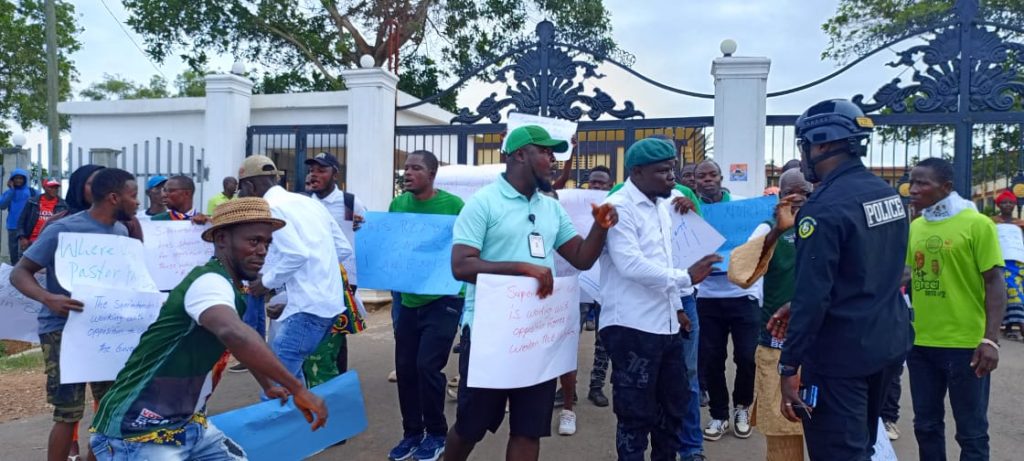The simmering discontent within the ruling Unity Party (UP) in Bong County, Liberia, has erupted into open protest, exposing deep-seated divisions and raising concerns about political patronage and loyalty in the post-election landscape. A group of self-proclaimed loyalists of President Joseph Nyumah Boakai staged a peaceful demonstration at the Bong County Administration Building, demanding the immediate removal of County Superintendent Hawa Norris. Their grievances stem from a perceived betrayal of grassroots supporters who, they claim, were instrumental in the party’s 2023 election victory, but are now being marginalized in favor of individuals with no established ties to the UP. This perceived sidelining has sparked accusations of systemic neglect and a failure to appoint loyal party members to key county-level positions.
The protestors, carrying placards proclaiming their dedication and demanding recognition for their contributions, articulated their frustration through spokesperson George Flomo. Flomo’s petition accused Superintendent Norris of consistently overlooking UP loyalists in appointments, characterizing this as a betrayal of the sacrifices made by dedicated party members during the election campaign. Their efforts, they argue, were pivotal to the party’s success, yet they are now being sidelined and excluded from the benefits of their hard-won victory. This sentiment of being disregarded after contributing significantly to the electoral triumph fuels their demand for a superintendent who shares their history of commitment and sacrifice.
Adding further fuel to the fire is President Boakai’s recent donation of a vehicle to Reverend James S. Paye of Christ Vision International Ministries in Gbarnga. This gesture has been interpreted by many UP supporters as a symbolic endorsement of a political outsider with no demonstrable allegiance to the party during the election. Reverend Paye is perceived as a close associate of Superintendent Norris, and the presidential gift is seen as further evidence of the growing influence of non-UP affiliates within the county’s governance structure. This perceived favoritism towards outsiders has exacerbated existing tensions within the party, with some protestors warning that such actions could further deepen the existing rifts and undermine party unity in Bong County.
The protestors not only express concern over the alleged marginalization of loyal UP members but also raise questions about Reverend Paye’s frequent presence near the superintendent’s office. They view this as a potential impediment to equitable access to government opportunities, further fueling their calls for Superintendent Norris’s replacement with a “loyal partisan.” This demand reflects a deep-seated belief that party loyalty should be rewarded and that those who labored for the party’s victory deserve a prominent role in its governance. They argue that prioritizing individuals with no demonstrable commitment to the party undermines the very foundation of their efforts and disincentivizes future grassroots engagement.
The protest, though peaceful and monitored closely by security personnel, underscores the fragility of the political landscape in Bong County. While Regional Gender Coordinator Viola Cooper-Teamah accepted the petition on behalf of the Ministry of Internal Affairs and urged dialogue and patience, the underlying issues remain unresolved. Superintendent Norris’s silence on the allegations further complicates matters, creating a vacuum of leadership and exacerbating the uncertainty surrounding the future of the party’s local governance. The absence of a direct response from the superintendent adds to the growing sense of unease and fuels speculation about the validity of the protestors’ claims.
This incident in Bong County serves as a microcosm of the broader challenges facing the Unity Party. The delicate balance of power, the management of political patronage, and the need to maintain unity within the ranks are critical considerations for the party’s long-term stability. The protest highlights the potential for intra-party conflicts to escalate if not addressed effectively. The onus now falls on President Boakai and the national leadership to respond in a way that addresses the concerns of the grassroots supporters while also maintaining party cohesion. The outcome of this situation will likely have significant implications for the ruling party’s future in one of its key strongholds. The president’s response, or lack thereof, will be closely scrutinized by both party members and political analysts, as it will signal how the UP intends to navigate the complex landscape of political loyalty and patronage moving forward.














